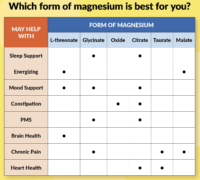
Now, with all the different types of magnesium out there, picking the right one can feel like navigating a maze. Let’s break down the most popular options and find out which one will best help you achieve your goals!
Whether you’re aiming for peak health, adjusting your diet, or just trying to fend off those pesky magnesium deficiencies, supplements might be your new best friend. And if you’re chugging high doses of vitamin D, you might need to up your magnesium game—otherwise, your body might get a bit hangry for it. Always a good idea to check in with your doctor to figure out what’s right for you.
Magnesium Glycinate
Let’s kick things off with magnesium glycinate, my top pick for a reason. It teams up magnesium with glycine, an amino acid, to make absorption smoother and gentler on your stomach. Most often found in capsules, you might prefer the powder version like I do—it’s less pill-popping and more stirring with water. Plus, the added water can help keep things moving in your digestive tract.
Magnesium glycinate is particularly good for calming nerves and boosting mood. Research suggests it could help with depression, anxiety, and memory issues. While we don’t fully understand how it works, it’s thought that magnesium levels might affect mental health before blood tests even pick up a deficiency. So, if you’re after evening calm or mood support, this one’s worth a try—and you might even get a bonus anti-inflammatory effect.
Magnesium Citrate
Next up is magnesium citrate, my second favorite. It’s budget-friendly, absorbs well, and can give your digestive system a gentle nudge if you’re dealing with occasional constipation. I prefer it in powder form, so you can mix it with water and stay regular.
It might help with relaxation, though not as strongly as glycinate. It’s also been studied for migraine prevention, but you’ll need high doses—around 600 mg—which can upset your stomach. Plus, too much magnesium can mess with your calcium levels, so some supplements add a bit of calcium for balance. It also shows promise for easing PMS symptoms by boosting magnesium during the premenstrual phase.
Magnesium Oxide
Magnesium oxide is the least glamorous of the bunch. It’s cheap and widely available but absorbs poorly. If you’re willing to take a higher dose and deal with possible digestive issues, it might work for you. But honestly, you might want to skip this one unless your budget is tight.
Magnesium Carbonate
Magnesium carbonate is worth a mention, especially if you like a little fizz with your supplement. It turns into magnesium citrate in your stomach, so when you mix it with water, you get a bubbly drink that soothes the stomach and helps with absorption. If you’re after a calming, fizzy supplement, this is a fun choice—just let the bubbles settle for maximum absorption.



Leave a comment
You must be logged in to post a comment.